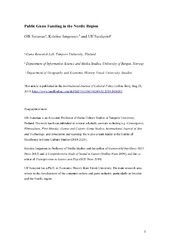Public game funding in the Nordic region
Peer reviewed, Journal article
Accepted version
Permanent lenke
http://hdl.handle.net/1956/22125Utgivelsesdato
2019Metadata
Vis full innførselSamlinger
Originalversjon
https://doi.org/10.1080/10286632.2019.1656203Sammendrag
In this paper, we explore the policies related to support structures surrounding national game industries, with focus on the three Nordic countries Finland, Norway and Sweden, and investigate what kind of context the Nordic welfare state model has provided for game development. The three cases illustrate how Nordic welfare state measures have interacted with the games industry over time. While the political ideals have been fairly similar, our study demonstrates how the objectives and practical means of state engagement have differed significantly. We argue that although the three countries all have support schemes of which game companies can take advantage, there are significant differences in the degree to which each individual country has organized government interventions and support. While the Finnish state has treated game development as an endeavour in business development, the regional Nordic game program and the Norwegian state has developed a cultural policy that primarily aims to protect the cultural heritage. The Swedish state has not established a tailormade policy directed towards game development but has a broad spectrum of general policies for supporting research and business development. We suggest that future research should investigate how the public funding is structured and how discourses are formulated around appeals for more public funding for the games industry.
Beskrivelse
Under embargo under: 2021-02-21
